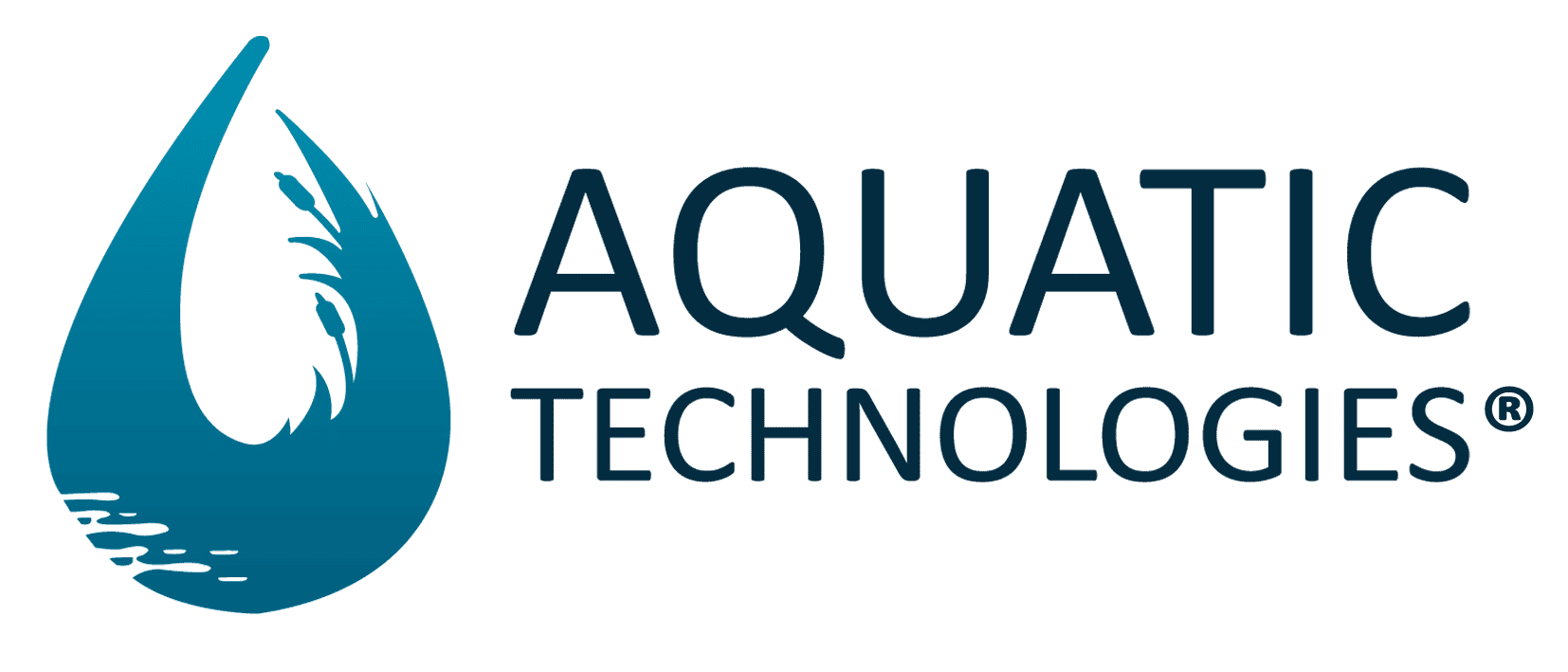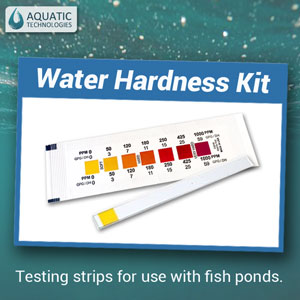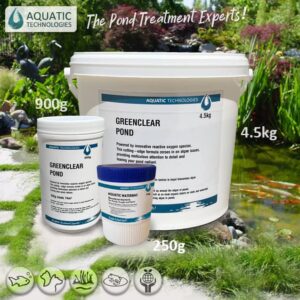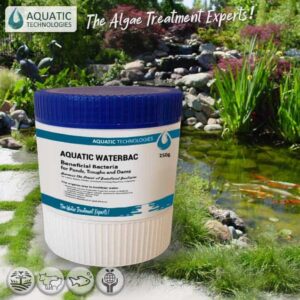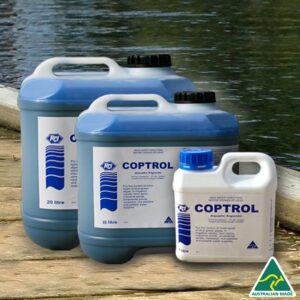5 x Water Hardness Test Kit
$5.00
Water Hardness Test Strips
We recommend you test your water for hardness where fish are present. Water testing strips help determine suitability for the use of algaecides such as Coptrol treatments where fish are involved.
- Single Test – Carbonate Water Hardness
From 0 to 1000 PPM - Tests Water Hardness From 0 to 1000 PPM
- Quick & Easy To Use
Out of stock

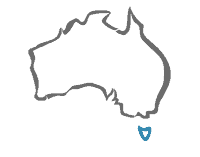
Use in conjunction with Coptrol in fish ponds
Coptrol when used with fish present is safe and effective. Using a Carbonate Hardness Test prior to applying certain algaecides in your pond is recommended when fish are involved. A water hardness greater than 50ppm helps fish that are sensitive to treatments. Hard water helps to control changes in pH and may prevent heavy metal impurities from effecting your fish. In addition, harder water usually contains higher alkalinity that may absorb acidic pond content and stabilise pH, thus keeping your fish healthy. These water hardness test strips are simple to use and will work in just a matter of minutes.
Water Hardness Test Strips
We recommend you test your water for hardness where fish are present. Water testing strips help determine suitability for the use of algaecides such as Coptrol treatments where fish are involved.
- Single Test – Carbonate Water Hardness From 0 to 1000 PPM
- Tests Water Hardness From 0 to 1000 PPM
- Quick & Easy To Use
All standard water quality parameters should be maintained in your pond to ensure health and safety of your fish, according to best practice for each fish species.
How to Use Test Strips: When used in conjunction with Coptrol
- Dip strip in water for 3 seconds, remove.
- Do not shake. Wait 20 seconds.
- Match up against closest colour tab on the packet.
- Colours are stable for 1 minute.
- Store Below 27C.

Water Hardness Using a Carbonate Hardness Test prior to applying certain algaecides in your pond is recommended when fish are involved. A water hardness greater than 50ppm helps fish that are sensitive to treatments. Hard water helps to control changes in pH and may prevent heavy metal impurities from effecting your fish. In addition, harder water usually contains higher alkalinity that may absorb acidic pond content and stabilise pH, thus keeping your fish healthy. These water hardness test strips are simple to use and will work in just a matter of minutes.
Use in conjunction with Coptrol in fish ponds.
Is Coptrol Safe?
Coptrol is a commercial grade algaecide that is safe and easy to use, APVMA approved and does not harm fish, livestock, plants, pastures or turf irrigated with water treated with Coptrol (when used in accordance with label instructions).
Will Coptrol harm fish?
No, Coptrol will not harm fish or other wildlife (when used in accordance with label instructions).
How does Coptrol work?
Coptrol is an Aquatic Algaecide. When applied to a body of water, the algae present actively seek out the Coptrol and absorb it for its nutritional value. Once Coptrol is absorbed by the algae through the cell wall, digestive enzymes in the algae cells break down the Coptrol compound and then release the active constituent inside the algae cell to kill it.
Can I use chlorine to kill algae?
Chlorine is not an effective way to kill algae, you won’t get a good kill rate using it. Chlorine is more for bacteria treatment or sterilisation.
Is algae harmful to humans and livestock?
A Harmful Algal Bloom (HAB), most cyanobacteria (blue green algae), can be toxic to humans and other animals. Algae are microscopic organisms that live in aquatic environments and photosynthesise to gain energy. In excess, these organisms become visible to the naked eye. Algal blooms vary in colour from brown, red, green or blue/green. Environmental factors such as increased temperature, high levels of nutrients (Nitrogen or Phosphorus), abundant sunlight and still or low-flowing water can trigger these events. HABs can lead to serious health effects in humans and animals such as; general paralysis, gastrointestinal illness, respiratory problems, liver damage and even death. Exposure to contaminated water bodies through both primary and secondary activities can lead to illness with mild symptoms similar to those of heat stroke and food poisoning. In the event of a harmful algal bloom, it is imperative that contact with the water body be avoided, including irrigation.
Use in conjunction with Coptrol in fish ponds.
• Download Water Hardness Test Strip Brochure PDF
• Download Coptrol SDS PDF
Description
Use in conjunction with Coptrol in fish ponds
Coptrol when used with fish present is safe and effective. Using a Carbonate Hardness Test prior to applying certain algaecides in your pond is recommended when fish are involved. A water hardness greater than 50ppm helps fish that are sensitive to treatments. Hard water helps to control changes in pH and may prevent heavy metal impurities from effecting your fish. In addition, harder water usually contains higher alkalinity that may absorb acidic pond content and stabilise pH, thus keeping your fish healthy. These water hardness test strips are simple to use and will work in just a matter of minutes.
Water Hardness Test Strips
We recommend you test your water for hardness where fish are present. Water testing strips help determine suitability for the use of algaecides such as Coptrol treatments where fish are involved.- Single Test – Carbonate Water Hardness From 0 to 1000 PPM
- Tests Water Hardness From 0 to 1000 PPM
- Quick & Easy To Use
All standard water quality parameters should be maintained in your pond to ensure health and safety of your fish, according to best practice for each fish species.
How To Use
How to Use Test Strips: When used in conjunction with Coptrol
- Dip strip in water for 3 seconds, remove.
- Do not shake. Wait 20 seconds.
- Match up against closest colour tab on the packet.
- Colours are stable for 1 minute.
- Store Below 27C.

Targets
Water Hardness Using a Carbonate Hardness Test prior to applying certain algaecides in your pond is recommended when fish are involved. A water hardness greater than 50ppm helps fish that are sensitive to treatments. Hard water helps to control changes in pH and may prevent heavy metal impurities from effecting your fish. In addition, harder water usually contains higher alkalinity that may absorb acidic pond content and stabilise pH, thus keeping your fish healthy. These water hardness test strips are simple to use and will work in just a matter of minutes.
Use in conjunction with Coptrol in fish ponds.
FAQ
Is Coptrol Safe?
Coptrol is a commercial grade algaecide that is safe and easy to use, APVMA approved and does not harm fish, livestock, plants, pastures or turf irrigated with water treated with Coptrol (when used in accordance with label instructions).
Will Coptrol harm fish?
No, Coptrol will not harm fish or other wildlife (when used in accordance with label instructions).
How does Coptrol work?
Coptrol is an Aquatic Algaecide. When applied to a body of water, the algae present actively seek out the Coptrol and absorb it for its nutritional value. Once Coptrol is absorbed by the algae through the cell wall, digestive enzymes in the algae cells break down the Coptrol compound and then release the active constituent inside the algae cell to kill it.
Can I use chlorine to kill algae?
Chlorine is not an effective way to kill algae, you won’t get a good kill rate using it. Chlorine is more for bacteria treatment or sterilisation.
Is algae harmful to humans and livestock?
A Harmful Algal Bloom (HAB), most cyanobacteria (blue green algae), can be toxic to humans and other animals. Algae are microscopic organisms that live in aquatic environments and photosynthesise to gain energy. In excess, these organisms become visible to the naked eye. Algal blooms vary in colour from brown, red, green or blue/green. Environmental factors such as increased temperature, high levels of nutrients (Nitrogen or Phosphorus), abundant sunlight and still or low-flowing water can trigger these events. HABs can lead to serious health effects in humans and animals such as; general paralysis, gastrointestinal illness, respiratory problems, liver damage and even death. Exposure to contaminated water bodies through both primary and secondary activities can lead to illness with mild symptoms similar to those of heat stroke and food poisoning. In the event of a harmful algal bloom, it is imperative that contact with the water body be avoided, including irrigation.
Resources
Use in conjunction with Coptrol in fish ponds.
• Download Water Hardness Test Strip Brochure PDF
• Download Coptrol SDS PDFVideos
Safe For
Use in conjunction with Coptrol in fish ponds
Coptrol when used with fish present is safe and effective. Using a Carbonate Hardness Test prior to applying certain algaecides in your pond is recommended when fish are involved. A water hardness greater than 50ppm helps fish that are sensitive to treatments. Hard water helps to control changes in pH and may prevent heavy metal impurities from effecting your fish. In addition, harder water usually contains higher alkalinity that may absorb acidic pond content and stabilise pH, thus keeping your fish healthy. These water hardness test strips are simple to use and will work in just a matter of minutes.
Water Hardness Test Strips
We recommend you test your water for hardness where fish are present. Water testing strips help determine suitability for the use of algaecides such as Coptrol treatments where fish are involved.- Single Test – Carbonate Water Hardness From 0 to 1000 PPM
- Tests Water Hardness From 0 to 1000 PPM
- Quick & Easy To Use
All standard water quality parameters should be maintained in your pond to ensure health and safety of your fish, according to best practice for each fish species.
How to Use Test Strips: When used in conjunction with Coptrol
- Dip strip in water for 3 seconds, remove.
- Do not shake. Wait 20 seconds.
- Match up against closest colour tab on the packet.
- Colours are stable for 1 minute.
- Store Below 27C.

Water Hardness Using a Carbonate Hardness Test prior to applying certain algaecides in your pond is recommended when fish are involved. A water hardness greater than 50ppm helps fish that are sensitive to treatments. Hard water helps to control changes in pH and may prevent heavy metal impurities from effecting your fish. In addition, harder water usually contains higher alkalinity that may absorb acidic pond content and stabilise pH, thus keeping your fish healthy. These water hardness test strips are simple to use and will work in just a matter of minutes.
Use in conjunction with Coptrol in fish ponds.
Is Coptrol Safe?
Coptrol is a commercial grade algaecide that is safe and easy to use, APVMA approved and does not harm fish, livestock, plants, pastures or turf irrigated with water treated with Coptrol (when used in accordance with label instructions).
Will Coptrol harm fish?
No, Coptrol will not harm fish or other wildlife (when used in accordance with label instructions).
How does Coptrol work?
Coptrol is an Aquatic Algaecide. When applied to a body of water, the algae present actively seek out the Coptrol and absorb it for its nutritional value. Once Coptrol is absorbed by the algae through the cell wall, digestive enzymes in the algae cells break down the Coptrol compound and then release the active constituent inside the algae cell to kill it.
Can I use chlorine to kill algae?
Chlorine is not an effective way to kill algae, you won’t get a good kill rate using it. Chlorine is more for bacteria treatment or sterilisation.
Is algae harmful to humans and livestock?
A Harmful Algal Bloom (HAB), most cyanobacteria (blue green algae), can be toxic to humans and other animals. Algae are microscopic organisms that live in aquatic environments and photosynthesise to gain energy. In excess, these organisms become visible to the naked eye. Algal blooms vary in colour from brown, red, green or blue/green. Environmental factors such as increased temperature, high levels of nutrients (Nitrogen or Phosphorus), abundant sunlight and still or low-flowing water can trigger these events. HABs can lead to serious health effects in humans and animals such as; general paralysis, gastrointestinal illness, respiratory problems, liver damage and even death. Exposure to contaminated water bodies through both primary and secondary activities can lead to illness with mild symptoms similar to those of heat stroke and food poisoning. In the event of a harmful algal bloom, it is imperative that contact with the water body be avoided, including irrigation.
Use in conjunction with Coptrol in fish ponds.
• Download Water Hardness Test Strip Brochure PDF
• Download Coptrol SDS PDFCoptrol is safe in and around water bodies with the following uses:


Description
Use in conjunction with Coptrol in fish ponds
Coptrol when used with fish present is safe and effective. Using a Carbonate Hardness Test prior to applying certain algaecides in your pond is recommended when fish are involved. A water hardness greater than 50ppm helps fish that are sensitive to treatments. Hard water helps to control changes in pH and may prevent heavy metal impurities from effecting your fish. In addition, harder water usually contains higher alkalinity that may absorb acidic pond content and stabilise pH, thus keeping your fish healthy. These water hardness test strips are simple to use and will work in just a matter of minutes.
Water Hardness Test Strips
We recommend you test your water for hardness where fish are present. Water testing strips help determine suitability for the use of algaecides such as Coptrol treatments where fish are involved.- Single Test – Carbonate Water Hardness From 0 to 1000 PPM
- Tests Water Hardness From 0 to 1000 PPM
- Quick & Easy To Use
All standard water quality parameters should be maintained in your pond to ensure health and safety of your fish, according to best practice for each fish species.
How To Use
How to Use Test Strips: When used in conjunction with Coptrol
- Dip strip in water for 3 seconds, remove.
- Do not shake. Wait 20 seconds.
- Match up against closest colour tab on the packet.
- Colours are stable for 1 minute.
- Store Below 27C.

Targets
Water Hardness Using a Carbonate Hardness Test prior to applying certain algaecides in your pond is recommended when fish are involved. A water hardness greater than 50ppm helps fish that are sensitive to treatments. Hard water helps to control changes in pH and may prevent heavy metal impurities from effecting your fish. In addition, harder water usually contains higher alkalinity that may absorb acidic pond content and stabilise pH, thus keeping your fish healthy. These water hardness test strips are simple to use and will work in just a matter of minutes.
Use in conjunction with Coptrol in fish ponds.
FAQ
Is Coptrol Safe?
Coptrol is a commercial grade algaecide that is safe and easy to use, APVMA approved and does not harm fish, livestock, plants, pastures or turf irrigated with water treated with Coptrol (when used in accordance with label instructions).
Will Coptrol harm fish?
No, Coptrol will not harm fish or other wildlife (when used in accordance with label instructions).
How does Coptrol work?
Coptrol is an Aquatic Algaecide. When applied to a body of water, the algae present actively seek out the Coptrol and absorb it for its nutritional value. Once Coptrol is absorbed by the algae through the cell wall, digestive enzymes in the algae cells break down the Coptrol compound and then release the active constituent inside the algae cell to kill it.
Can I use chlorine to kill algae?
Chlorine is not an effective way to kill algae, you won’t get a good kill rate using it. Chlorine is more for bacteria treatment or sterilisation.
Is algae harmful to humans and livestock?
A Harmful Algal Bloom (HAB), most cyanobacteria (blue green algae), can be toxic to humans and other animals. Algae are microscopic organisms that live in aquatic environments and photosynthesise to gain energy. In excess, these organisms become visible to the naked eye. Algal blooms vary in colour from brown, red, green or blue/green. Environmental factors such as increased temperature, high levels of nutrients (Nitrogen or Phosphorus), abundant sunlight and still or low-flowing water can trigger these events. HABs can lead to serious health effects in humans and animals such as; general paralysis, gastrointestinal illness, respiratory problems, liver damage and even death. Exposure to contaminated water bodies through both primary and secondary activities can lead to illness with mild symptoms similar to those of heat stroke and food poisoning. In the event of a harmful algal bloom, it is imperative that contact with the water body be avoided, including irrigation.
Resources
Use in conjunction with Coptrol in fish ponds.
• Download Water Hardness Test Strip Brochure PDF
• Download Coptrol SDS PDFVideos
Safe For
